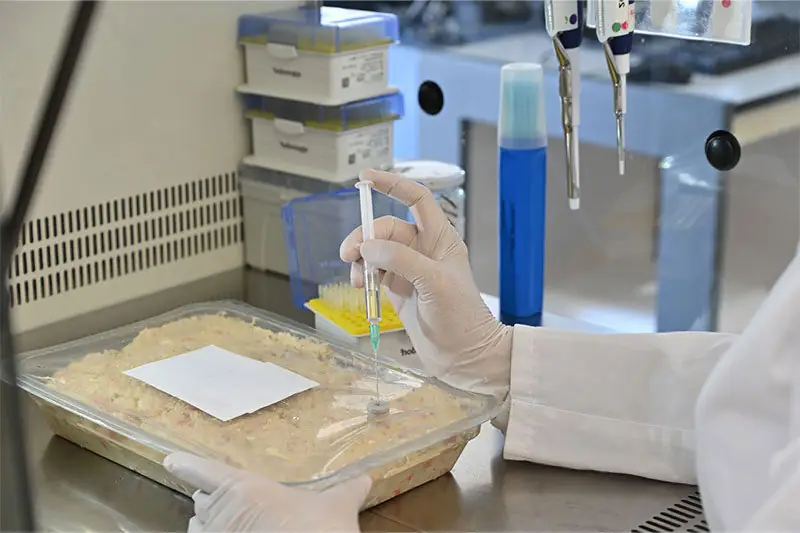Routine QC Microbiology Testing for Cosmetics
Quality control (QC) microbiology testing is a critical component in ensuring the safety and efficacy of cosmetic products. This process involves the regular analysis of raw materials, intermediates, finished goods, and packaging to detect microbial contamination that could pose health risks or affect product quality.
The primary goal of routine QC microbiology testing for cosmetics is to prevent potential hazards associated with microbial growth in cosmetic formulations. Microorganisms such as bacteria, yeast, and mold can spoil products, cause allergic reactions, or even lead to serious infections if not properly controlled. By incorporating strict QC protocols into their manufacturing processes, cosmetic companies adhere to stringent regulatory requirements.
Microbiological safety testing typically includes several key procedures: sterility tests, total viable counts (TVC), aerobic plate count (APC), and specific pathogen detection. These tests help manufacturers identify any contamination early in the production cycle so corrective actions can be taken promptly. Additionally, these tests provide valuable insights into the stability of raw materials and packaging materials which are crucial for maintaining product integrity.
At Eurolab, we have extensive experience providing reliable QC microbiology testing services tailored specifically to the cosmetic industry. Our team uses advanced technologies and methodologies that comply with international standards such as ISO 22716:2013, which sets out requirements for personal care products including cosmetics.
Our approach ensures consistency across all stages of product development from raw material sourcing through final packaging. This includes validating suppliers' processes to ensure they meet the necessary hygiene levels required by regulators around the world. We also offer comprehensive analytical support throughout every stage of production ensuring that any issues are addressed before reaching consumers.
Applied Standards
Routine QC microbiology testing for cosmetics must follow established guidelines and practices set forth by regulatory bodies like the European Union, United States Food & Drug Administration (FDA), World Health Organization (WHO) among others. These organizations provide detailed protocols on how to conduct various tests ensuring products remain safe from microbial contamination.
- ISO 22716:2013: Personal Care Products - Good Manufacturing Practices (GMP)
- US FDA Cosmetics Regulations
- European Union Cosmetics Regulation
- WHO Guidelines for Microbiological Safety of Cosmetic Products
The application of these standards ensures consistent results and compliance with global regulations. It also helps maintain consumer trust by demonstrating a commitment to high-quality practices.
Eurolab Advantages
At Eurolab, our expertise in cosmetic QC microbiology testing is unmatched. With years of experience working with leading brands worldwide, we understand the unique challenges faced by the cosmetics industry when it comes to ensuring product safety and quality.
- Comprehensive Analytical Support: From raw material evaluation through finished product release, our team provides expert guidance at every step of the way.
- Advanced Instrumentation: Utilizing state-of-the-art equipment allows us to deliver precise results quickly and accurately.
- Regulatory Compliance: Our services are designed to meet all applicable regulations ensuring your products remain compliant with international standards.
- Supplier Validation: We help validate suppliers' processes to ensure they meet the necessary hygiene levels required by regulators.
- Industry Knowledge: Our team stays current with the latest trends and developments in the cosmetic industry, allowing us to offer innovative solutions that address emerging challenges.
Partnering with Eurolab means gaining access to unparalleled expertise in cosmetic QC microbiology testing. Together, we can help ensure your products are safe, effective, and meet all regulatory requirements.
Environmental and Sustainability Contributions
- Eco-Friendly Packaging Solutions: By ensuring the safety of raw materials early in the production process, we reduce waste associated with product recalls later on. This practice promotes sustainable resource management.
- Reduced Energy Consumption: Efficient testing methods minimize energy consumption during analyses without compromising accuracy or reliability.
- Minimized Waste Generation: Through precise sampling and efficient testing procedures, we help minimize unnecessary sample preparation steps which contribute to lower overall waste generation.
The environmental benefits of routine QC microbiology testing extend beyond just reducing immediate wastes; it also promotes long-term sustainability by helping manufacturers make informed decisions about their supply chains and operational processes. By adopting these practices early on in the product lifecycle, cosmetic companies can significantly reduce their ecological footprint while maintaining high standards of quality.





